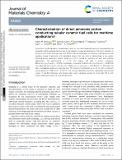Characterisation of direct ammonia proton conducting tubular ceramic fuel cells for maritime applications
Abstract
Ammonia is now being widely considered as a carrier for low carbon hydrogen due to its favourable physical properties and the existing infrastructure for its transport, storage and distribution. The direct utilisation of ammonia in Protonic Ceramic Fuel Cells (PCFCs) has the advantages of ammonia cracking activity and avoiding mixing of ammonia with generated steam. Here we seek to demonstrate a low-carbon electrical power generation system based on a PCFC fueled by ammonia for port and maritime applications. The performance of a 36 cm2 tubular cell with a proton conductive BaCe0.7Zr0.1Y0.16Zn0.04O3−δ (BCZYZ) electrolyte, composite Ni/BaCe0.7Zr0.1Y0.16Zn0.04O3−δ (Ni/BCZYZ) fuel electrode and La0.8Sr0.2Co0.5Fe0.5O3−δ/BaCe0.7Zr0.1Y0.16Zn0.04O3−δ LSCF/BCZYZ air electrode has been investigated using pure ammonia fuel. The tested cell generated up to 8.5 W with a maximum power density of 0.236 W cm−2 at 750 °C. The cell was operated in pure NH3, repeatedly characterised using I–V and EIS techniques, and tested under load to generate current for more than 140 h, with a fairly stable performance at a current above 8 A.
Citation
Nowicki , K M , Carins , G , Bayne , J , Tupberg , C , Irvine , G J & Irvine , J T S 2023 , ' Characterisation of direct ammonia proton conducting tubular ceramic fuel cells for maritime applications ' , Journal of Materials Chemistry A , vol. 11 , no. 1 , pp. 352-363 . https://doi.org/10.1039/d2ta07310b
Publication
Journal of Materials Chemistry A
Status
Peer reviewed
ISSN
2050-7488Type
Journal article
Collections
Items in the St Andrews Research Repository are protected by copyright, with all rights reserved, unless otherwise indicated.

